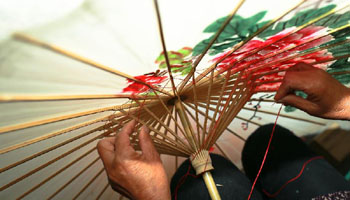WASHINGTON, Nov. 24 (Xinhua) -- Social status can alter the function of the immune system but the effects are reversible, a new study in rhesus monkeys said Thursday.
The study, based on adult female rhesus monkeys housed at Emory University's Yerkes National Primate Research Center, showed that low-status monkeys are more likely to have unwanted inflammation than their high-status counterparts after infection, but improvements in social status can turn things back around.
The findings could help explain why poor and working class people have higher rates of inflammatory disorders, such as heart disease and diabetes, according to the study published in the U.S. journal Science.
"Social adversity gets under the skin," co-first author Noah Snyder-Mackler, postdoctoral researcher at Duke University, said in a statement. "If we can help people improve their social standing, and reduce some of these hierarchies, we may be able to improve people's health and well-being."
In the study, researchers first put 45 unrelated females that had never met each other one by one into new social groups and found these animals formed a pecking order in order of seniority, with those introduced to their groups earlier tending to rank higher than those that came later.
To find out how rank affected their health, the researchers took immune cells from the monkeys and measured the activity of roughly 9,000 genes.
More than 1,600 of the genes were expressed differently in lower-ranking than in higher-ranking females, particularly within a type of white blood cell called natural killer cells, the first line of defense against infection.
Then, the researchers rearranged the females into nine new social groups. Once again, the females sorted themselves in order of arrival, with the first females to join the newly-formed groups ranking higher than latecomers.
In the re-sorting, the researchers made females that were previously high on the dominance ladder move down one or more rungs, and those that were low were moved up.
Those whose status improved became more sought-after grooming partners once they were promoted, giving them more opportunities to relieve stress through bonding, the researchers said.
The immune cells of formerly low-ranking females also became more like those of high-ranking females, in terms of which genes were turned on or off, when they improved their social standing, they said.
"This suggests the health effects of status aren't permanent, at least in adulthood," said study co-author Jenny Tung, assistant professor of evolutionary anthropology and biology at Duke.
The results provide solid causal evidence that low social status leads to disparities in health, not just the other way around, as some have argued, said Tung.
The differences between higher- and lower-ranking females were even more pronounced when their immune systems were triggered to fight a potential pathogen.
When the animals' white blood cells were mixed in test tubes with a bacterial toxin called lipopolysaccharide, pro-inflammatory genes in the cells from subordinate females went into overdrive.
If similar molecular mechanisms underlie the link between social status and health in humans, interventions that improve a person's social support network could be just as important as drugs for mitigating the physiological costs of low status, the researchers said.










